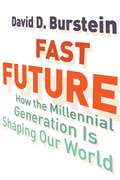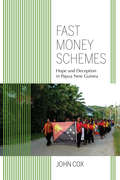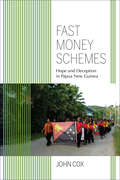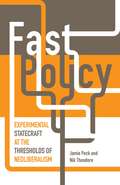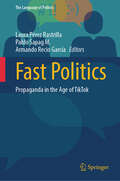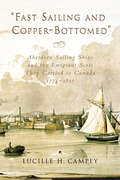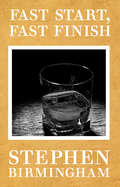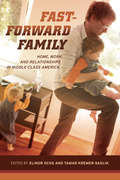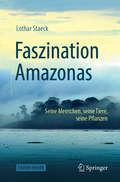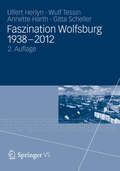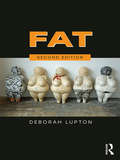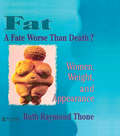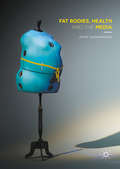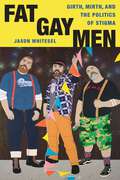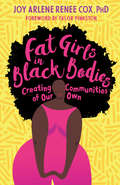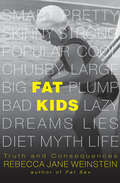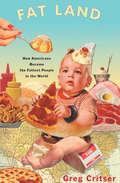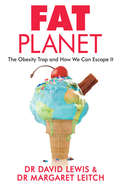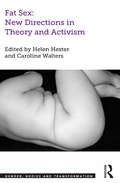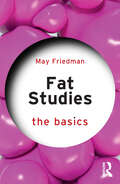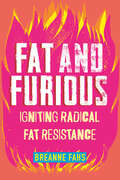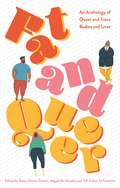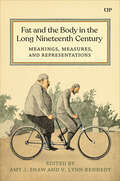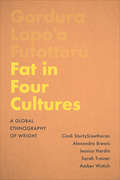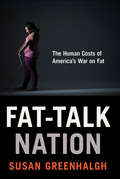- Table View
- List View
Fast Future: How the Millennial Generation Is Shaping Our World
by David D. BursteinA millennial examines how his generation is profoundly impacting politics, business, media, and activismThey've been called trophy kids, entitled, narcissistic, the worst employees in history, and even the dumbest generation. But, argues David Burstein, the millennial generation's unique blend of civic idealism and savvy pragmatism will enable us to overcome a deeply divided nation facing economic and environmental calamities.With eighty-million millennials (people who are today eighteen to thirty years old) coming of age and emerging as leaders, this is the largest generation in U.S. history, and, by 2020, its members will represent one out of every three adults. They are more ethnically and racially diverse than their elders and have begun their careers at a time when the recession has set back the job market. Yet they remain optimistic about their future and are deeply connected to one another. Drawing on extensive interviews with his millennial peers and compelling new research, Burstein illustrates how his generation is simultaneously shaping and being shaped by a fast-paced and fast-changing world.Part oral history, part social documentary, Fast Future reveals the impact and story of the millennial generation--in its own words.
Fast Money Schemes: Hope and Deception in Papua New Guinea (Framing the Global)
by John CoxIn the late 1990s and early 2000s a wave of Ponzi schemes swept through Papua New Guinea, Australia, and the Solomon Islands. The most notorious scheme, U-Vistract, attracted many thousands of investors, enticing them with promises of 100 percent interest to be paid monthly. Its founder, Noah Musingku, was a charismatic leader who promoted the scheme as a form of Christian mission and as the basis for establishing an independent kingdom. Fast Money Schemes uses in-depth interviews with investors, newspaper accounts, and participant observation to understand the scheme's appeal from the point of view of those who invested and lost, showing that organizers and investors alike understood the scheme as a way of accessing and participating in a global economy. John Cox delivers a "post-village" ethnography that gives insight into the lives of urban, middle-class Papua New Guineans, a group that is not familiar to US readers and that has seldom been a focus of anthropological interest. The book's concern with understanding the interweaving of morality, finance, and aspirations shared by a global cosmopolitan middle class has wide resonance beyond studies of Papua New Guinea and anthropology.
Fast Money Schemes: Hope and Deception in Papua New Guinea (Framing the Global)
by John CoxA history and anthropological analysis of one of Papua New Guinea’s worst Ponzi schemes in the late 1990s.In the late 1990s and early 2000s a wave of Ponzi schemes swept through Papua New Guinea, Australia, and the Solomon Islands. The most notorious scheme, U-Vistract, attracted many thousands of investors, enticing them with promises of one percent interest to be paid monthly. Its founder, Noah Musingku, was a charismatic leader who promoted the scheme as a form of Christian mission and as the basis for establishing an independent kingdom.Fast Money Schemes uses in-depth interviews with investors, newspaper accounts, and participant observation to understand the scheme’s appeal from the point of view of those who invested and lost, showing that organizers and investors alike understood the scheme as a way of accessing and participating in a global economy. John Cox delivers a “post-village” ethnography that gives insight into the lives of urban, middle-class Papua New Guineans, a group that is not familiar to US readers and that has seldom been a focus of anthropological interest. The book’s concern with understanding the interweaving of morality, finance, and aspirations shared by a global cosmopolitan middle class has wide resonance beyond studies of Papua New Guinea and anthropology.
Fast Policy: Experimental Statecraft at the Thresholds of Neoliberalism
by Jamie Peck Nik TheodoreWe inhabit a perpetually accelerating and increasingly interconnected world, with new ideas, fads, and fashions moving at social-media speed. New policy ideas, especially &“ideas that work,&” are now able to find not only a worldwide audience but also transnational salience in remarkably short order. Fast Policy is the first systematic treatment of this phenomenon, one that compares processes of policy development across two rapidly moving fields that emerged in the Global South and have quickly been adopted worldwide⎯conditional cash transfers (a social policy program that conditions payments on behavioral compliance) and participatory budgeting (a form of citizen-centric urban governance). Jamie Peck and Nik Theodore critically analyze the growing transnational connectivity between policymaking arenas and modes of policy development, assessing the implications of these developments for contemporary policymaking. Emphasizing that policy models do not simply travel intact from sites of invention to sites of emulation, they problematize fast policy as a phenomenon that is real and consequential yet prone to misrepresentation. Based on fieldwork conducted across six continents and in fifteen countries, Fast Policy is an essential resource in providing an extended theoretical discussion of policy mobility and in presenting a methodology for ethnographic research on global social policy.
Fast Politics: Propaganda in the Age of TikTok (The Language of Politics)
by Laura Pérez Rastrilla Pablo Sapag M. Armando Recio GarcíaThe goal of this book is to show the role of TikTok as a tool for political purposes. To this end, the authors analyse the messages posted on this social medium by political figures and institutions such as politicians and political parties, their impact on political landscapes, as well as the transformation of political communication techniques in order to suit the platform’s features. In the last two years, the exponential growth of TikTok has led an increasing number of politicians and institutions to incorporate it into their communication strategies. The platform displays some very different features from other social media that determine the way in which the content is presented. In addition, it manages to reach an audience that normally does not access or share political messages.Within this context, the volume pursues two main objectives. First, to examine how the communication techniques and the peculiarities of this social medium – where short videos with actors in informal attitudes prevail – affect the political message. A second objective is to analyse the influence of the messages distributed through TikTok that redefine political scenarios, and of the relationships of politicians and parties with voters. The core of the book comprises case studies that are organised into three parts, with nine chapters in all.The authors are scholars and practitioners of political communication, with diverse geographical representation, who approach the topics from a range of methodological perspectives. The first part addresses the state of the art and the influence of TikTok features on the way political communication is performed. The second part discusses the influence of TikTok on electoral scenarios and political culture in India, Bangladesh, the United States, and Ecuador. Finally, in the third part, TikTok is analysed as an instrument for promoting far right politicians and parties in Europe, as in the case of Matteo Salvini in Italy, and AfD in Germany and Vox in Spain.The volume is oriented to both scholars and communication professionals, such as journalists, communication consultants, and speechwriters, who want to become familiar with the platform, learn about its political impact, or wish to deepen their understanding of transformations in communication techniques and their adaptation to this growing social medium.
Fast Sailing and Copper-Bottomed: Aberdeen Sailing Ships and the Emigrant Scots They Carried to Canada, 1774-1855
by Lucille H. CampeyThe days when Aberdeen’s "fast sailing and copper-bottomed" ships carried emigrant Scots to Canada are brought to life in this fascinating account of the northern Scotland exodus during the sailing ship era. Taking readers through new and little-used documentary sources, Lucille H. Campey finds convincing evidence of good ships, sailed by experienced captains and managed by reputable people, thus challenging head on the perceived imagery of abominable sea passages in leaking old tubs. And by considering the significance of ship design and size, she opens a new window on our understanding of emigrant travel. Instead of concentrating on the extreme cases of suffering and mishaps, to be found in anecdotal material, Campey’s approach is to identify all of the emigrant sea crossings to Canada made on Aberdeen sailing ships.Observing the ships which collected passengers from the port of Aberdeen as well as those which collected emigrants at Highland ports, especially Cromarty and Thurso, Campey reveals the processes at work and the people who worked behind the scenes to provide the services. Her following of the emigrant Scots on to their New World destinations in New Brunswick, Nova Scotia and Upper Canada provides us with an opportunity to see how events in Canada were influencing both the decision to emigrate and choice of location. These emigrant Scots succeeded, often after difficult beginnings, and would endow Canada with their rich traditions and culture which live on to this day.
Fast Start, Fast Finish
by Stephen BirminghamFast Start, Fast Finish is a novel of suspense, art, marriage, family, and the hollowness of suburbia, from one the country's most important documentarians of the well-to-do. Charlie Lord is handsome, smart and devastatingly sophisticated. Why does his life keep coming to a blazing halt?
Fast-Forward Family
by Tamar Kremer-Sadlik Elinor OchsCalled "the most unusually voyeuristic anthropology study ever conducted" by the New York Times, this groundbreaking book provides an unprecedented glimpse into modern-day American families. In a study by the UCLA Sloan Center on Everyday Lives and Families, researchers tracked the daily lives of 32 dualworker middle class Los Angeles families between 2001 and 2004. The results are startling, and enlightening. Fast-Forward Family shines light on a variety of issues that face American families: the differing stress levels among parents; the problem of excessive clutter in the American home; the importance (and decline) of the family meal; the vanishing boundaries that once separated work and home life; and the challenges for parents as they try to reconcile ideals regarding what it means to be a good parent, a good worker, and a good spouse. Though there are also moments of connection, affection, and care, it's evident that life for 21st century working parents is frenetic, with extended work hours, children's activities, chores, meals to prepare, errands to run, and bills to pay.
Faszination Amazonas: Seine Menschen, seine Tiere, seine Pflanzen
by Lothar StaeckIn diesem Band wird der Amazonas und sein angrenzender Regenwald in allen wichtigen Facetten dargestellt: Zum einen ist es das riesige Flusssystem selbst mit seinem Geflecht aus Weiß-, Schwarz- und Klarwasserflüssen. Aus den unterschiedlichen Wasserqualitäten resultieren enorme Auswirkungen auf Menschen, Tiere und Pflanzen. Zum anderen werden die Menschen beschrieben, die an diesem "Rio Mar", dem Meeres-Fluss, leben. Es sind die Caboclos, die Nachfahren der europäischen Einwanderer und der Urbevölkerung, und es sind die unterschiedlichen indigenen Völker, die sich meist an den Flussufern niedergelassen haben, da die Flüsse hier die Straßen ersetzen und überhaupt erst einen Kontakt zu anderen Menschen ermöglichen. Diese Volksgruppen sind zwar seit Generationen mit der westlichen Zivilisation in Kontakt, doch sie haben überraschenderweise auch heute noch eine Reihe bemerkenswerter Traditionen bewahrt, die hier beschrieben werden. Der Schatz der Amazonasregion sind seine Pflanzen und Tiere. Deshalb werden ausführlich die faszinierendsten Blütenpflanzen, darunter zahlreiche Heilpflanzen, Bäume, Epiphyten und Lianen unterschiedlicher Lebensräume beschrieben und mit hervorragenden Fotos illustriert. Schließlich sind es die Tiere, vor allem im und am Fluss, aber auch im angrenzenden Regenwald, die uns Europäer seit Alexander von Humboldt schon immer fasziniert haben. Hier wird nicht nur die Lebensweise der legendären Rosa-Delfine, Piranhas und Vogelspinnen erläutert, sondern auch auf eindrucksvolle Amphibien, Reptilien und Säugetiere des Urwaldes eingegangen.
Faszination Wolfsburg 1938-2012
by Gitta Scheller Annette Harth Wulf Tessin Ulfert HerlynAnhand von vier Studien, die einen Zeitraum von nahezu 50 Jahren umfassen, werden Geschichte und Probleme der Volkswagenstadt Wolfsburg anschaulich dargestellt. Auf der Basis einmaligen empirischen Materials wird ein Überblick über die städtebaulichen und sozialen Probleme einer Stadtneugründung gegeben. Von besonderem Interesse ist hierbei die monostrukturelle Prägung der Lebensbedingungen und der stadtentwicklungspolitischen Perspektiven durch das VW-Werk.
Fat
by Deborah LuptonIn contemporary western societies, the fat body has become a focus of stigmatizing discourses and practices aimed at disciplining, regulating and containing it. Despite the fact that in many western countries fat bodies outnumber those that are thin, fat people are still socially marginalized, and treated with derision and even repulsion and disgust. Medical and public health experts continue to insist that an ‘obesity epidemic’ exists and that fatness is a pathological condition which should be prevented and controlled. Fat is a book about why the fat body has become so reviled and reviewed as diseased, the target of such intense discussion and debate about ways to reduce its size down to socially and medically acceptable dimensions. It is about the lived experience of fat embodiment: how does it feel to be fat in a fat phobic-society? Fat activism and obesity politics, and related controversies, are also discussed. Internationally-renowned sociologist Deborah Lupton explores fat as a sociocultural artefact: a bodily substance or body shape that is given meaning by complex and shifting systems of ideas, practices, emotions, material objects and interpersonal relationships. This analysis identifies broader preoccupations and trends in the ways that human bodies and selfhood are experienced and practised. The second and much expanded edition of Fat is twice as long as the original edition. Lupton incorporates the very latest current critical scholarship and research offered in the humanities and social sciences on fat embodiment and fat politics. New updated material is presented in every chapter, including substantial additional sections on new digital media. Fat is a lively, at times provocative introduction for the general reader, as well as for students and academics interested in the politics of embodiment and health.
Fat - A Fate Worse Than Death?: Women, Weight, and Appearance
by Ellen Cole Esther D Rothblum Ruth R ThoneDespite the gains of the women’s movement, women are still judged by what they look like--and men, by what they do. Fat--A Fate Worse Than Death? offers hardy resistance to the narrow, random, and irrational appearance standards set for American women through an approach that is personal, eclectic, courageous, and funny. If you are interested in giving up your diet, throwing out your scales, and concentrating on who you are on a deeper level, this book will show you how to accept, appreciate, and even love your body!Using statistics, research, anecdotes, and personal experiences, Fat--A Fate Worse Than Death? explores how appearance standards have built a prison for women. With the book’s helpful advice, reading suggestions, and list of more than 100 ways to fight looksism, sexism, ageism, and racism, you will learn to express your rights and needs, regardless of your shape or size, and tear down those prison walls. Designed to transcend the boundaries between the personal and the political, Fat--A Fate Worse Than Death? discusses: examples of how weight and size constitute the last socially accepted prejudice the national “War on Fat” counteracting societal influences that support weight preoccupation connection between appearance standards for older women and large women nurturing your body resisting male-defined standards of beauty for women the myth of diets and dieting how the body resists weight loss how women are disempowered by concentration on weight and appearance how concentrating on appearance leaves real-life issues unaddressed how feeling bad about yourself can turn you into a willing consumerFeminists, faculty and students of women’s studies programs, aging women, women of radical politics, and other concerned women and men will find that Fat--A Fate Worse Than Death? states explicitly how women are kept powerless by subscribing to cultural and social edicts on physical appearance. Don’t live silently in a society that degrades and discounts women because of their physical stature and don‘t let obsession with thinness keep you passive, docile, and unable to give your energy to things that really need your passion and intelligence. Read this book and learn to not only value yourself for who you are, but also to counteract American culture’s equality-denying prejudices and practices.
Fat Bodies, Health and the Media
by Jayne RaisboroughOur televisions bulge with weight-loss shows, as the news warn of the obesity epidemic. Fat is such a villain that larger people are stigmatized and we all are seduced by life-changing claims of a multi-billion pound diet industry. Yet, when we question if our bathroom scales can really tell us about our health, we start to ask just why and how fat holds such fascination. In this book, Jayne Raisborough explores interpretations of fat bodies from Palaeolithic Europe to Poverty Porn TV to argue that fat's materiality makes it ripe for stigmatising associations. However, especially in a social context that presents health as a matter of choice, fat also emerges as an ideal redemptive substance to be pummelled and starved into submission. This book presents a 'fat sensibility' to demonstrate how fat is helping us all become responsibilised healthy-citizens. It asks just what self are we being asked to diet ourselves into?
Fat Gay Men: Girth, Mirth, and the Politics of Stigma (Intersections #1)
by Jason WhiteselTo be fat in a thin-obsessed gay culturecan be difficult. Despite affectionate in-group monikers for big gay men–chubs,bears, cubs–the anti-fat stigma that persists in American culture at largestill haunts these individuals who often exist at the margins of gaycommunities. In Fat Gay Men, JasonWhitesel delves into the world of Girth & Mirth, a nationally known socialclub dedicated to big gay men, illuminating the ways in which these men formidentities and community in the face of adversity. In existence for over fortyyears, the club has long been a refuge and ‘safe space’ for such men. Both a partial insider as a gay man and anoutsider to Girth & Mirth, Whitesel offers an insider’s critique of the gaymovement, questioning whether the social consequences of the failure to beheight-weight proportionate should be so extreme in the gay community. This book documents performances at club events and examines howparticipants use allusion and campy-queer behavior to reconfigure and reclaimtheir sullied body images, focusing on the numerous tensions of marginalizationand dignity that big gay men experience and how they negotiate these tensionsvia their membership to a size-positive group. Based on ethnographic interviewsand in-depth field notes from more than 100 events at bar nights, caféklatches, restaurants, potlucks, holiday bashes, pool parties, movie nights,and weekend retreats, the book explores the woundedness that comes from beingrelegated to an inferior position in gay hierarchies, and yet celebrates howsome gay men can reposition the shame of fat stigma through carnival, camp, andplay. A compelling and rich narrative, FatGay Men provides a rare glimpse into an unexplored dimension of weight andbody image in American culture.
Fat Girls in Black Bodies: Creating Communities of Our Own
by Joy Arlene CoxCombatting fatphobia and racism to reclaim a space for womxn at the intersection of fat and BlackTo be a womxn living in a body at the intersection of fat and Black is to be on the margins. From concern-trolling--"I just want you to be healthy"--to outright attacks, fat Black bodies that fall outside dominant constructs of beauty and wellness are subjected to healthism, racism, and misogynoir. The spaces carved out by third-wave feminism and the fat liberation movement fail at true inclusivity and intersectionality; fat Black womxn need to create their own safe spaces and community, instead of tirelessly laboring to educate and push back against dominant groups.Structured into three sections--"belonging," "resistance," and "acceptance"--and informed by personal history, community stories, and deep research, Fat Girls in Black Bodies breaks down the myths, stereotypes, tropes, and outright lies we've been sold about race, body size, belonging, and health. Dr. Joy Cox's razor-sharp cultural commentary exposes the racist roots of diet culture, healthism, and the ways we erroneously conflate body size with personal responsibility. She explores how to reclaim space and create belonging in a hostile world, pushing back against tired pressures of "going along just to get along," and dismantles the institutionally ingrained myths about race, size, gender, and worth that deny fat Black womxn their selfhood.
Fat Kids: Truth and Consequences (Fat Books #2)
by Rebecca Jane WeinsteinFat Kids: Truth and Consequences is an informational vault of deeply personal tales and essential information, focusing on the lives, questions, and concerns of parents and children living in a childhood obesity crisis. Unlike most books about weight, however, Fat Kids is not a dieting or weight loss how-to; it instead explores the true human experiences and often untold science outside the current political positioning on children and weight. This book powerfully combines interviews, relevant research, social anecdotes, personal author accounts, and the reality of children struggling with weight, to create a narrative that is profoundly poignant, accessible, and essential for understanding our current war on fat. Fat Kids is a truly unique work; all other books focusing on children and weight are solely focused only on diet and weight loss. This book, with its empathetic point of view, raw emotion, and solid information, is a necessary voice in the literary scene.
Fat Land: How Americans Became the Fattest People in the World
by Greg Critser&“An in-depth, well-researched, and thoughtful exploration of the &‘fat boom&’ in America.&” —TheBoston Globe Low carb, high protein, raw foods . . . despite our seemingly endless obsession with fad diets, the startling truth is that six out of ten Americans are overweight or obese. In Fat Land, award-winning nutrition and health journalist Greg Critser examines the facts and societal factors behind the sensational headlines, taking on everything from supersize to Super Mario, high-fructose corn syrup to the high costs of physical education. With a sharp eye and even sharper tongue, Critser examines why pediatricians are now treating conditions rarely seen in children before; why type 2 diabetes is on the rise; the personal struggles of those with weight problems—especially among the poor—and how agribusiness has altered our waistlines. Praised by the New York Times as &“absorbing&” and by Newsday as &“riveting,&” this disarmingly funny, yet truly alarming, exposé stands as an important examination of one of the most pressing medical and social issues in the United States. &“One scary book and a good companion to Eric Schlosser&’s Fast Food Nation.&” —Seattle Post-Intelligencer
Fat Planet: The Obesity Trap and How We Can Escape It
by Dr David Lewis Dr Margaret LeitchOur planet is in the grip of an obesity pandemic.More than a billion people worldwide are overweight and over 600 million are obese. We live in an obesogenic environment in which it is much easier to get fat than to stay fit. How has this come to be? Who is to blame? What can we do?In Fat Planet, Dr David Lewis and Dr Margaret Leitch examine the social and psychological causes of the obesity pandemic in order to answer these questions. They use ground-breaking research to highlight the behaviour of corporations that relentlessly promote foods high in sugar, fat and salt, and show that these ‘junk’ foods have shockingly similar neurological effects to hard drugs. They consider the prevalence of food cues which unconsciously stimulate our desire to consume. And they debunk the myths of fad diets and slimming pills, suggesting practical, easily implemented strategies for sustainable weight loss.The evidence is clear: our problem with obesity must be addressed or we will face catastrophic consequences. It is not too late to change.
Fat Sex: New Directions In Theory And Activism (Gender, Bodies and Transformation)
by Helen Hester Caroline WaltersWhile fat sexual bodies are highly visible as vehicles for stigma, there has been a lack of scholarly research addressing this facet of contemporary body politics. Fat Sex: New Directions in Theory and Activism seeks to rectify this, bringing debates about fat sex into the academic arena and providing a much-needed critical space for voices from across the spectrum of theory and activism. It examines the intersection of fat, sex and sexuality within a contemporary cultural landscape that is openly hostile towards fat people and their perceived social and aesthetic transgressions. Acknowledging and engaging with some of the innovative work being done by artists, activists, and academics around the issue of fat sex, this collection both challenges preconceptions regarding fatness and sexuality, but also critiques and debates various aspects of the fat activist approach. It draws on a wide range of disciplinary perspectives, bringing together work from the UK, US, Europe, and Australia to offer a wide-ranging examination of the issues of size, sex, and sexuality. A cutting-edge exploration not only of fat sex, but of identity politics, neoliberalism and contemporary body activism in general, Fat Sex: New Directions in Theory and Activism will be of interest to scholars of sociology, cultural studies, geography, porn studies and literary studies working on questions of gender, sexuality and the body.
Fat Studies: The Basics (The Basics)
by May FriedmanFat Studies: The Basics introduces the reading of fat bodies and the ways that Fat Studies, as a field, has responded to waves of ideas about fat people, their lives, and choices.Part civil rights discourse and part academic discipline, Fat Studies is a dynamic project that involves contradiction and discussion. In order to understand this field, the book also explores its intersections with race, class, gender, sexuality, age, disability, ethnicity, migration and beyond. In addition to thinking through terminology and history, this book will aim to unpack three key myths which often guide Fat Studies, showing that: fat is a meaningful site of oppression intersected with other forms of discrimination and hatred to be fat is not a choice (but also that a discussion of choice is itself problematic); and fat cannot be unambiguously correlated with a lack of health Fat Studies: The Basics is a lively and accessible foundation for students of Gender Studies, Sociology, Psychology, and Media Studies, as well as anyone interested in learning more about this emergent field.
Fat and Furious: Igniting Radical Fat Resistance
by Breanne FahsA bold takedown of the ways women are terrorized about fatness, and a treatise on the revolutionary power of fat furyAnti-fatness and fat-shaming are used most often as a way to inspire fear in others about being or becoming fat. Scholar and therapist Breanne Fahs breaks down how the dread of fatness is used to control and capitalize on women&’s fears of their unruly bodies and demonstrates how rejecting shame and instead igniting feelings of anger can help us collectively move towards justice.Weaving together the voices of fat people and activists with damning psychological and sociological evidence, Fahs chronicles how fat oppression and fear-mongering impacts every aspect of our lives, from media representation to workplace and healthcare discrimination to the problem with body positivity movements, and even how we handle fat death. She argues that rage, or fat fury, becomes the necessary antidote to the resignation and powerlessness that anti-fatness so often generates.Illuminating and infuriating, Fahs intertwines the personal and systemic impacts of anti-fatness and calls on all of us—fatter and thinner alike—to reflect and revolt.
Fat and Queer: An Anthology of Queer and Trans Bodies and Lives
by Bruce Owens Grimm, Miguel M. Morales and Tiff Joshua TJ FerentiniWe're here. We're queer. We're fat.This one-of-a-kind collection of prose and poetry radically explores the intersection of fat and queer identities, showcasing new, emerging and established queer and trans writers from around the world.Celebrating fat and queer bodies and lives, this book challenges negative and damaging representations of queer and fat bodies and offers readers ways to reclaim their bodies, providing stories of support, inspiration and empowerment.In writing that is intimate, luminous and emotionally raw, this anthology is a testament to the diversity and power of fat queer voices and experiences, and they deserve to be heard.
Fat and the Body in the Long Nineteenth Century: Meanings, Measures, and Representations
by V. Lynn Kennedy Amy J. ShawIn the nineteenth and early twentieth centuries, the body was a key focus of discourse. Fat and the Body in the Long Nineteenth Century animates discussion and analyses of fatness, highlighting how corporeal expectations fit into larger social systems and showing how interpretations have shifted over time. This collection examines a host of primary sources – including literature, art, medical treatises, journalism, political cartoons, soldiers’ letters home, and popular fiction – to identify trends in how fat was perceived and promoted in the English-speaking world over the long nineteenth century. Divided into four thematic sections, the book addresses epistemologies, artistic and literary representations, the turn towards quantification and measurement, and the connections to imperialism and colonialism. It explores the complex debate about the meaning of fat and its signalling of health, beauty, moral strength, and class status. The book shows how contemporary presentations and discussions of fat offer insights into ideals of gender and race and the processes of imperialism and of professionalization in the social sciences and medicine. By tracing how debates shifted over time, the book ultimately reveals that there was no universal interpretation of fat as a positive or negative characteristic throughout the nineteenth century.
Fat in Four Cultures: A Global Ethnography of Weight (Teaching Culture: UTP Ethnographies for the Classroom)
by Jessica Hardin Alexandra Brewis Amber Wutich Sarah Trainer Cindi SturtzSreetharanTraits that signal belonging dictate our daily routines, including how we eat, move, and connect to others. In recent years, "fat" has emerged as a shared anchor in defining who belongs and is valued versus who does not and is not. The stigma surrounding weight transcends many social, cultural, political, and economic divides. The concern over body image shapes not only how we see ourselves, but also how we talk, interact, and fit into our social networks, communities, and broader society. Fat in Four Cultures is a co-authored comparative ethnography that reveals the shared struggles and local distinctions of how people across the globe are coping with a bombardment of anti-fat messages. Highlighting important differences in how people experience "being fat," the cases in this book are based on fieldwork by five anthropologists working together simultaneously in four different sites across the globe: Japan, the United States, Paraguay, and Samoa. Through these cases, Fat in Four Cultures considers what insights can be gained through systematic, cross-cultural comparison. Written in an eye-opening and narrative-driven style, with clearly defined and consistently used key terms, this book effectively explores a series of fundamental questions about the present and future of fat and obesity.
Fat-Talk Nation: The Human Costs of America’s War on Fat
by Susan GreenhalghIn recent decades, America has been waging a veritable war on fat in which not just public health authorities, but every sector of society is engaged in constant "fat talk" aimed at educating, badgering, and ridiculing heavy people into shedding pounds. We hear a great deal about the dangers of fatness to the nation, but little about the dangers of today's epidemic of fat talk to individuals and society at large. The human trauma caused by the war on fat is disturbing--and it is virtually unknown. How do those who do not fit the "ideal" body type feel being the object of abuse, discrimination, and even revulsion? How do people feel being told they are a burden on the healthcare system for having a BMI outside what is deemed--with little solid scientific evidence--"healthy"? How do young people, already prone to self-doubt about their bodies, withstand the daily assault on their body type and sense of self-worth? In Fat-Talk Nation, Susan Greenhalgh tells the story of today's fight against excess pounds by giving young people, the campaign's main target, an opportunity to speak about experiences that have long lain hidden in silence and shame.Featuring forty-five autobiographical narratives of personal struggles with diet, weight, "bad BMIs," and eating disorders, Fat-Talk Nation shows how the war on fat has produced a generation of young people who are obsessed with their bodies and whose most fundamental sense of self comes from their size. It reveals that regardless of their weight, many people feel miserable about their bodies, and almost no one is able to lose weight and keep it off. Greenhalgh argues that attempts to rescue America from obesity-induced national decline are damaging the bodily and emotional health of young people and disrupting families and intimate relationships.Fatness today is not primarily about health, Greenhalgh asserts; more fundamentally, it is about morality and political inclusion/exclusion or citizenship. To unpack the complexity of fat politics today, Greenhalgh introduces a cluster of terms--biocitizen, biomyth, biopedagogy, bioabuse, biocop, and fat personhood--and shows how they work together to produce such deep investments in the attainment of the thin, fit body. These concepts, which constitute a theory of the workings of our biocitizenship culture, offer powerful tools for understanding how obesity has come to remake who we are as a nation, and how we might work to reverse course for the next generation.
